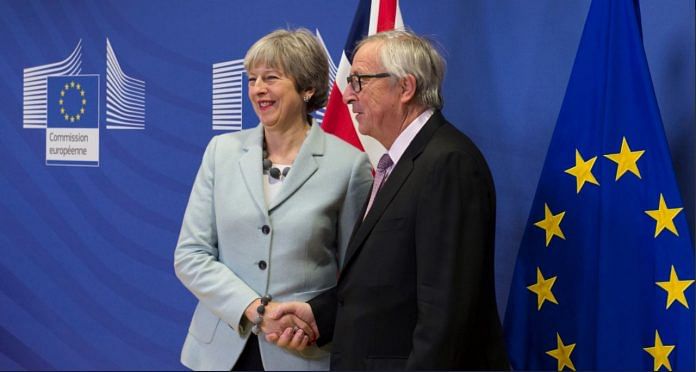The global community tends to have a greater impact on domestic happenings than one would expect. Nothing illustrates this better than tyrants using Donald Trump’s rhetoric to to validate their abuses of power, or how the West complicates issues in areas like the Middle East instead of simplifying them. Meanwhile, Ukraine is being ignored by the West as it flounders in a struggle against corruption, and the new Brexit deal is barely a breakthrough, slated to create several more issues for Britain the EU together.
Diplomacy over confrontation
The international community — and Europe in particular — should jettison its suspicion about Iran and instead focus its efforts on tackling real threats to the world, li e the wars engulfing the Middle East, writes Javad Zarif, Foreign Affairs Minister of Iran, in the New York Times.
“The nuclear deal is a rare triumph of diplomacy over confrontation. Undermining that would be a mistake. Europe should not pander to Washington’s determination to shift focus to yet another unnecessary crisis — whether it be Iran’s defensive missile program or our influence in the Middle East. This would repeat the very dynamics that preceded the nuclear deal.”
“Unfortunately, for the past 11 months, the response to Iran’s good faith has been tantrums from the Trump administration. But the unreliability of the United States — from climate change to Palestine— has become predictable. Our main concern now is cautioning European countries against wavering on issues beyond the scope of the nuclear agreement and following in lock step behind the White House. As the nuclear deal and the Middle East enter uncharted and potentially combustible territory, it is imperative that Europe helps ensure that we don’t soon find ourselves repeating history.”
Despots love fake news
Donald Trump has given despots across the world the gift of “fake news”. “Authoritarian rulers across the world are adopting President Donald Trump’s favorite phrase to limit free speech, with prominent leaders or state media in at least 15 countries using his ‘fake news’ line to denounce their critics, according to a POLITICO review,” writes Jason Schwartz in Politico.
“By aligning themselves with Trump’s words, despots have been able to use the U.S. president as a shield for their attacks on press freedom and human rights, said Joel Simon, executive director of the Committee to Protect Journalists.”
“In February, for example, Syrian President Bashar Assad brushed off an Amnesty International report that some 13,000 people had been killed at one of his military prisons by saying, ‘You can forge anything these days, we are living in a fake news era’.
In the Philippines, President Rodrigo Duterte has complained of being ‘demonised’ by ‘fake news’. Last month, with Trump laughing by his side, he called reporters ‘spies’.
Over the weekend, a state official in Myanmar attracted notice when he said, ‘There is no such thing as Rohingya. It is fake news’, referring to the persecuted ethnic group.”
State-building Ukraine
Ukraine is in the throes of another revolution. This time, it is against corruption, and The Economist writes that without foreign support, Ukraine will lose this uphill battle.
“The hope that Ukraine’s corrupt elites could themselves reform Ukraine and introduce the rule of law was never high. But their dependence on Western support, and the West’s alliance with Ukraine’s thriving civil-society activists, gave some cause for optimism. Both these factors have since weakened. Civil society has failed to build political muscle, while the European Union is suffering Ukraine fatigue. Most important, says Yulia Mostovaya, the editor of Zerkalo Nedeli, an independent weekly, is that America no longer has a comprehensive Ukraine policy.”
The movement is largely against elitist corruption, putting its state-hood at risk.”Ukraine’s squabbling elites take little responsibility for their state, uniting only to battle the civil activists and independent institutions that threaten their oligopoly.”
The movement is not without some global focus. Ukraine is an important country in Russian politics, and this is might be precisely the reason why the United States does not have a comprehensive Ukraine policy in place.
“The oligarchs are confident that America lacks the will to back up its rhetoric. Admitting that Ukraine is corrupt and dysfunctional would prompt uncomfortable questions among American voters about their country’s involvement and sanctions against Russia.”
Insufficient Progress
The Brexit negotiations made significant headway on Friday when Theresa May announced that the negotiation has achieved “sufficient progress”, meeting the European Union’s threshold for such. However, Yasmeen Serhan writes in The Atlantic that this breakthrough deal won’t prove to be much of a breakthrough.
“Thus far, it’s a breakup that has in many ways favored the EU,” she writes. “Though the deal has been dubbed an early Christmas present by some British lawmakers, EU negotiators were quick to point out that the Brexit negotiations are not a sprint, but a series of hurdles—and the race is still far from over.”
There are two reasons why 2018 will be more difficult than 2017, according to Serhan. “The first is that the focus of the next phase of negotiations—which will cover the U.K.’s transition out of the EU and its future relationship with the bloc—will likely be much more difficult.” Negotiations on trade can only truly begin after the UK exits the EU.
“The second reason is political uncertainty. While May appears to have weathered much of the political instability that rocked her minority government in recent weeks, there’s no telling what divisions could arise during the next phase of negotiations—or how long May will be able to withstand them as premier.”
“As noted on the very first page of the joint report, “Nothing is agreed until everything is agreed”—a caveat that will almost certainly mean the return of some or all of the withdrawal issues when talks resume in 2018.”



